- Home
- Patrick Ness
Joyride
Joyride Read online
DON’T MISS THE OTHER THRILLING COMPANION NOVELS IN THE CLASS SERIES!
Class: The Stone House
Class: What She Does Next Will Astound You
DEDICATION
To my favourite nephew, James.
Who always ensures the cats will be fed.
CONTENTS
Dedication
One: They Say Shock Does Strange Things
Two: A Pretend Name for a Pretend Human
Three: ‘Be Ready for the Time of Your Life’
Four: Sometimes a Bed Can Become Empty (Even When There’s Someone in It)
Five: Designed to Make Normal Humans Cry
Six: Max Was a Nice Guy
Seven: Two of the Three of Them Got to Walk Away from It
Eight:
Nine: Just Trying
Ten: The Wallflower of Shoreditch Is Completely Off Her Head
Eleven: What’s Wrong with Everything?
Twelve: Garry, Old Son, You Just Became a Millionaire
Thirteen: School, Football Practise, Home
Fourteen: The Joy of Being Garry Fletcher
Fifteen: An Abattoir in Silhouette
Sixteen: Data Retrieval
Seventeen: A Hard Time for the Coal Hill School Administrative Waste Bin
Eighteen: Steve’s Little Problem
Nineteen: No Control
Twenty: He Just Might Be Able to Save the World
Twenty-One: ‘I’m Going to Cut This Bloke to Pieces’
Twenty-Two: Lying Like a True Adult
Twenty-Three: Nobody Tells Garry Fletcher What to Do
Twenty-Four: ‘I Really Don’t Want You Killing My Friends’
Twenty-Five: Steve Tries to Come Up with a Plan
Twenty-Six: Warring in Suburbia
Twenty-Seven: Garry Fletcher Needs to Turn Over a New Leaf
Twenty-Eight: It Is Now
Twenty-Nine: No More Time at All
Thirty: Picking Up the Basics
Thirty-One: Steve Negotiates for the Continued Use of His Legs
Thirty-Two: An Unexpectedly Busy Day for the Metropolitan Police Service
Thirty-Three: Say Nothing
Thirty-Four: Normal
Bonus Material
Back Ad
About the Authors
Books by Patrick Ness and Guy Adams
Credits
Copyright
About the Publisher
ONE
THEY SAY SHOCK DOES STRANGE THINGS
Bizarrely, the first thing out of Poppy’s mum’s mouth when she hears the news is ‘But she hasn’t passed her test.’ They say shock does strange things.
It’s true. Poppy has been saving up for her driving lessons, working weekends and evenings to get the money together. In fact, in saving up her cash, she showed exactly the sort of single-minded determination that is in full evidence when she punctures the betting shop window with the bonnet of a stolen car. It’s the only thing she does that evening that’s true to character.
Poppy has always been fastidious. Her friends mock her for the obsessive way she keeps her room tidy, everything in its right place. There’s no sign of that tidiness as she hangs through the shattered windscreen of the car, bloodied and dusted with crystals of shattered glass, head like a stomped-on jam doughnut. Still, if the confetti of betting slips that twirl around her as she dies upsets her, she doesn’t show it. She’s laughing through a ruptured throat, a wet explosion of humour, spluttering its last across the chrome paintwork of the bonnet long before the ambulance arrives.
Stephen Patrick is still sore from his chosen horse limping its way around Aintree as if it was diseased or suicidal. He hates that laugh. It reminds him of childhood nightmares. A creature in his bathroom sink. Gurgled death threats from beyond the U-bend. ‘She weren’t right in the head,’ he tells the investigating police officer.
No kidding, thinks WPC Delano as she scribbles down his comments in her notebook.
WPC Delano draws the short straw and is forced to tell Poppy’s parents why their daughter won’t be coming home. Ever. She sits on their immaculate, floral-patterned sofa in silence while they stare, argue, stare some more, and then eventually cry. Throughout all this Delano is barely there, her head replaying the sight of Poppy being pulled back inside the car by the SOCOs, her loose face flapping and squeaking on the car paintwork.
Delano’s next job is to trace the full stop of the crash back to wherever the incident started. It isn’t difficult. Poppy—mousey Poppy, insecure and nervous Poppy—tore through Shoreditch like a weather front.
Ten minutes before she dies, she’s in the middle of her shift behind the ‘oven fresh’ counter of Morefields, the supermarket where she works. Her skin and hair are oily from the grease of the roast chickens that slow-dance around the rotisserie.
She’s never given any sign of hating the job; it is what it is, a way of making money. A shortcut to a car and better nights out.
According to the department manager, she simply stops what she’s doing; takes off the plastic trilby hat staff are forced to wear, its brim turned slightly yellow from poultry fat; and flings it into the air like a cheap Frisbee. She then climbs over the counter itself, feet crushing steak bakes and cheese and onion slices, and walks out of the shop, leaving slowly diminishing, meaty footprints behind her.
The department manager catches up with her at the automatic doors but she ignores his angry questions, shoving him into a display of chocolates and making her way out into the car park.
If anyone suspects this isn’t the first time Poppy has stolen a car, the meal she makes of it sets them straight.
After twenty seconds spent trying to break the driver’s window of a silver Honda with a small stone and a lot of screaming, she should, by rights, end her sudden streak of rebellion right there. But the woman who rushes over to stop her is holding her own car keys in her hand. Three vicious punches later and Poppy is running towards the open driver’s door of her new ride, its owner howling on the ground with a broken nose.
Roar of ignition, crump of metal as she reverses back into the car parked behind her, and then a squeal of petrified tyres as she’s tearing out of the car park at fifty miles per hour. Behind her, the car she rammed is blaring out its alarm like an indignant old lady, unable to quite believe the sheer audacity of the behaviour she’s just witnessed.
It’s pure good luck that there’s a break in the traffic as Poppy pulls out onto the road. Fortunate too that the solitary pedestrian on the zebra crossing is quick enough to throw herself out of the way before Poppy hits her.
The sluggish traffic is bothering some people, tutting and complaining, offering frequent insults to the traffic lights. It doesn’t bother Poppy. Poppy doesn’t seem bothered by anything as she hammers the horn and straddles the white line, other cars veering out of her way as she refuses to slow down.
One guy, still seething from a particularly lousy meeting at the head office of the marketing company where he works, decides there’s no way he’s going to be the one to back down. He’s spent the last two hours backing down. Gregson, still swaggering from the success of his pitiful campaign for a broadband supplier, had trashed every single one of his ideas until, by the end of the meeting, the oily little sod had won the damn account off him. No more. This silly cow coming up on him was going to have to be the one to swerve. He’s thinking that right up until he yanks the steering wheel at the last minute and sends his car into the back of a truck delivering building supplies. The second-to-last thing that goes through his head is ‘Why does today hate me so much?’ The last thing to go through his head is a piece of scaffolding. His lousy day ends with his head looking like an angry cocktail cherry.
If Poppy notices, she doesn’t care. She’s now
four minutes away from the window of the betting shop and a final, brief leap through the windscreen of this car.
Nobody calls the police, they’re far too busy filming Poppy on their phones. The news channels are spoilt for choice when it comes to wobbly camera footage. That evening Poppy will be a TV star, or at least the back of her head will be. There is only one, vaguely useable shot of her from the front and it shows a face that even her closest friends don’t recognise: a wild, screaming, laughing, evil face, all teeth and eyes so big they look like they’re about to bounce down onto her red cheeks.
The last casualty of the journey—other than herself—is a man trying to fit a stepladder into the backseat of his car. It’s not Poppy that hits him; it’s a car veering out of her way that slams the back door on him so hard you could have folded his remains like a shop display T-shirt.
Two minutes away from the betting shop window.
A group of schoolkids cheer as Poppy goes past. To them this seems fun, a bit of action to break up the long trudge home. Something they can message their mates about later. They won’t let facts get in the way of a good story; each of them will claim they were nearly hit by the car, each of them will claim they heard her laughing as she went by (she was laughing by all accounts, laughing every minute of the way, but there’s no way they could have heard it over the roar of the engine and the constant beeping of car horns). One of them will even insist they got off with Poppy at a party, as if breathlessly cupping the breast of someone who would later go on to kill herself confers magic onto them.
One minute away from the betting shop window.
The last race at Aintree has been run. Nobody’s made their fortune. Stephen Patrick tears up his betting slip, takes a sip of cold vending-machine tea, and wonders whether he can be bothered to cook tonight. Maybe he’ll just stop in at the chippy on the way home. Oh, and, by the way, what’s all the noise outside? Car horns and a revving engine. Sounds like some kind of carnival is heading his way.
When the window breaks, it sounds as if someone has let a firecracker off in the shop. The air is full of noise and glass. Nobody screams or shouts, it’s all too sudden for that, there’s just a lot of confused spinning and stumbling. Seconds ago, most people in the room were cursing their bad luck. Five minutes later and they’ll have changed their minds. It’s frankly phenomenal that nobody is seriously hurt. This isn’t a big shop; in fact, on major race days, regular customers complain about the fact—but then they complain about most things. It certainly isn’t big enough that you should be able to drive a car through it without killing everyone. There are injuries of course—you don’t add a rainstorm of shattered glass to a room without drawing a little blood. One of the older customers dislocates his hip as he’s knocked back against the wall.
Strangely, the worst injured of all is Mandy Ridgeway, who’s working behind the counter. She’s so shocked to see a car driving towards her inside her place of work, a building not commonly troubled by motor traffic, that she topples back off her stool and cracks her head open on the low shelf behind her. She’ll have a serious concussion and a neck injury that will flare up for years to come.
‘Why do you think she did it?’ WPC Delano’s partner asks her as they lie in bed that night. The police officer’s head is still replaying the sight of Poppy as her dead body is pulled back inside the darkness of the car. It’s like prey being pulled back into a bear’s cave, she thinks, battered and beaten, softened up for easy chewing.
‘I haven’t a clue,’ she tells him. ‘Not the first idea.’
She’s not alone.
TWO
A PRETEND NAME FOR A PRETEND HUMAN
‘It doesn’t make sense. If I kick it to death will it start to make sense?’
‘Madam?’
Quill turns from the Oyster top-up machine and stares George Barker in the eye. He decides he’d fancy her if she wasn’t so terrifying. Then he decides he fancies her anyway and worries quite what that says about him.
‘You work here?’
‘I don’t wear the uniform for fun, Madam.’
‘That’s not entirely my experience of uniforms.’
‘Oh aye?’ He attempts a cheeky smile. He thinks it’s a cheeky smile, though without a mirror to hand it’s hard to tell. Cheeky smiles are not something he gets a lot of practise at. By the way her expression somehow manages to get even more hostile, he guesses he may have been slightly off the mark. Either that or she is entirely immune to cheeky smiles.
‘No,’ she says, ‘don’t get that look on your face you awful, awful man.’
He tries to turn the smile that may have been, but most probably wasn’t, cheeky into a look of genuine concern and sympathy. He’s not bad at that look. When you work for Transport for London, you tend to use it quite often. In fact, it’s probably his second most well-worn look, narrowly beaten by ‘firm but polite refusal’.
‘What look, Madam?’
‘The look that suggests you’re imagining something sordid regarding uniforms. If I see it again, I’m likely to punch you.’
‘We have a firm policy with regard to abuse of staff, Madam.’
‘I bet you do—you’d have to, working in this hellhole. You’re probably fending off justifiable assassination attempts on the hour, every hour.’ The woman relaxes slightly. ‘This stupid machine won’t top up my Oyster card.’
‘I see, let me have a look.’
He moves to the machine and starts tapping away at the touch screen in the sort of manner he hopes conveys extreme professionalism, the sort of manner that broadcasts his ability to Get Things Done. She just stares at the crowds around them with a slight look of disgust.
‘Look at them,’ she says. ‘They don’t have a problem. They’re all about their soya-milk lattes and their copies of the Metro. I’ve led armies, fought wars; I have held dying comrades in my arms and fought on.’
‘Oh yes?’ he says, not really listening because the machine is misbehaving and trying to offer him a return to Basildon.
‘And now I can’t even get a few stops on the Central line without it all being a drama.’
‘I know what you mean,’ he mumbles, wondering why he’s now looking at a five-day pass. ‘I’m not sure the machine’s working properly.’
‘I told you that, didn’t I?’
‘Yes, Madam, I suppose you did. If you come to the counter, I’ll top it up there.’
‘Joy.’
The woman with too many names, none of which feel quite like her own anymore, walks into the corner shop, having finally managed to top up her card and get home.
‘Hello, Miss Quill,’ someone says as they walk past her and out of the door.
Who the hell was that? she wonders. They sounded infuriatingly cheerful. She’s half a mind to give chase and push them into a puddle just to teach them a lesson about life. Lesson. Yes. It was Danielle Westby, Year Eleven. She has tried to teach her physics. Tried to teach her physics in the same way one might try to teach a dog how to repair the engine on a light aircraft.
Miss Quill. A pretend name for a pretend human. How tedious it all is.
Once, light-years from here, she had been a rebel leader, fighting the Rhodia, willing to die for freedom (or, at the very least, the pleasure of really bloodying their supercilious noses). Then she had been captured and forced into the slavery of the young Rhodian prince. They put a creature in her brain, a tiny, single-minded thing of teeth and claws. The creature will kill her unless she protects the prince. Basically, it takes all the fun out of life and gives her the odd migraine into the bargain. Joy.
The great rebel is now bonded to the will of her enemy. Well, the only one left alive, because shortly after her capture, the Shadow Kin wiped both her and the prince’s people out and forced the two of them into hiding. The scourge of the Rhodia, now disguised and trapped on a backwater planet being forced to teach dumb children and, even worse, do grocery shopping.
She walks along the shop aisles, staring
at strange food she loathes the taste of and can’t really be bothered to buy. In the old days she would simply have raided this entire building for necessary supplies, leaving a trail of blood and destruction. That was an honest way of gathering food and supplies; nobody would ask you for a store loyalty card or try to indulge in small talk. How she misses it.
Eventually, she throws a few tins of baked beans into a handbasket just to show that she can adapt to anything, given time—even shopping. Deciding to really go for broke, she adds a sliced brown loaf, along with something that rattles in its pack like the desiccated remains of a corpse (glancing at the label it will apparently become edible if she pours boiling water on it), and a box of breakfast cereal that manages to look healthy and yet also insufferably smug and childish at the same time. She stares at the box for a minute, hating the appalling beautiful people who are skipping along a beach while the wind makes their hair flow out behind them like banners of war. She drops the box in her basket and decides that’s quite enough shopping for today.
‘Hello,’ says the man behind the counter. ‘Would you like a bag?’
‘Absolutely—with the way today’s been going, I can suffocate myself with it later.’
He looks confused for a moment. ‘They put little holes in them now,’ he says eventually, ‘so you can’t.’
‘Spoilsports.’
She asks for a small bottle of vodka as well, because this amount of being dull and human demands a reward.
Shopping safely stowed away in her nonlethal carrier bag, she walks home, hoping with every step that the house will be empty when she gets there.
It isn’t. The front room is infested with annoying young people. She wonders if that awful shop will sell her a spray to deal with them.
One is the young man who is as much ‘Charlie’ as she is ‘Miss Quill’. He is the enslaver, ruler of a toppled people, prince of a dead world, and infrequent tidier of his room. The other is his insufferably pretty boyfriend, Matteusz. He is Polish, which, as far as Quill can tell, means he’s human but uses slightly fewer contractions.

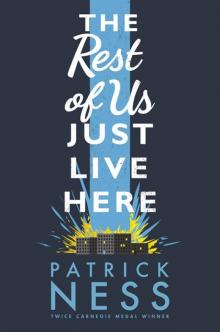 The Rest of Us Just Live Here
The Rest of Us Just Live Here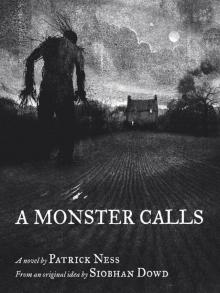 A Monster Calls
A Monster Calls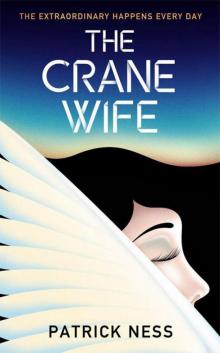 The Crane Wife
The Crane Wife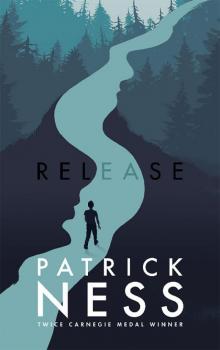 Release
Release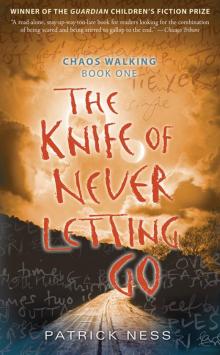 The Knife of Never Letting Go
The Knife of Never Letting Go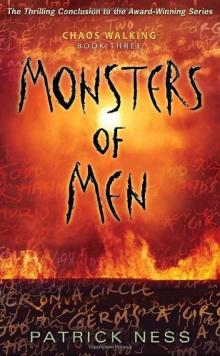 Monsters of Men
Monsters of Men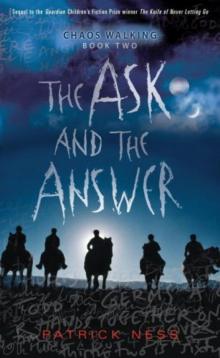 The Ask and the Answer
The Ask and the Answer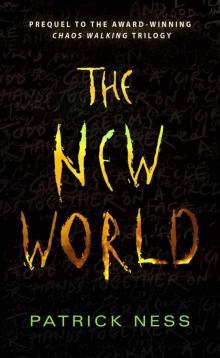 The New World
The New World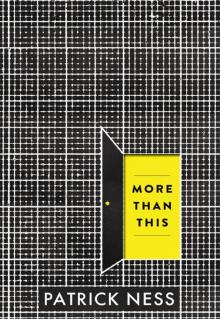 More Than This
More Than This Burn
Burn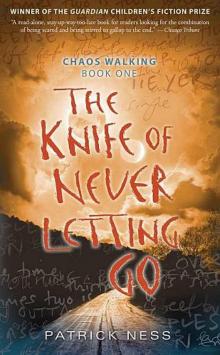 The Knife of Never Letting Go cw-1
The Knife of Never Letting Go cw-1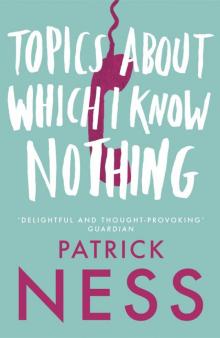 Topics About Which I Know Nothing
Topics About Which I Know Nothing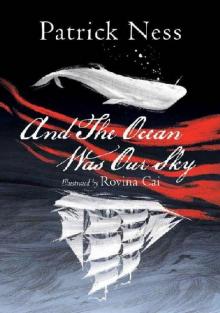 And The Ocean Was Our Sky
And The Ocean Was Our Sky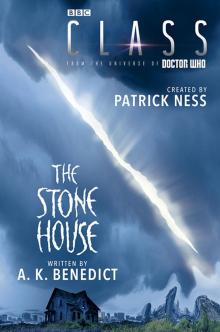 The Stone House
The Stone House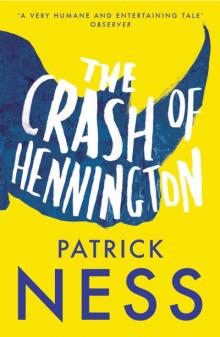 The Crash of Hennington
The Crash of Hennington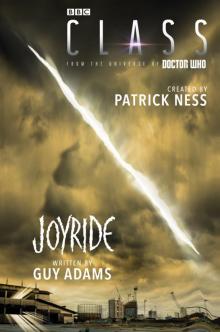 Joyride
Joyride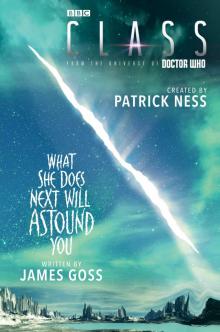 What She Does Next Will Astound You
What She Does Next Will Astound You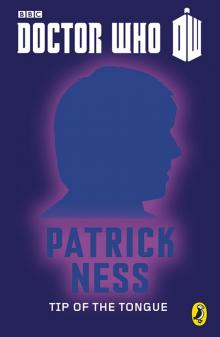 Tip Of The Tongue
Tip Of The Tongue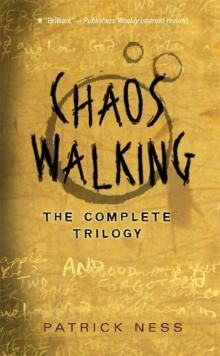 Chaos Walking
Chaos Walking